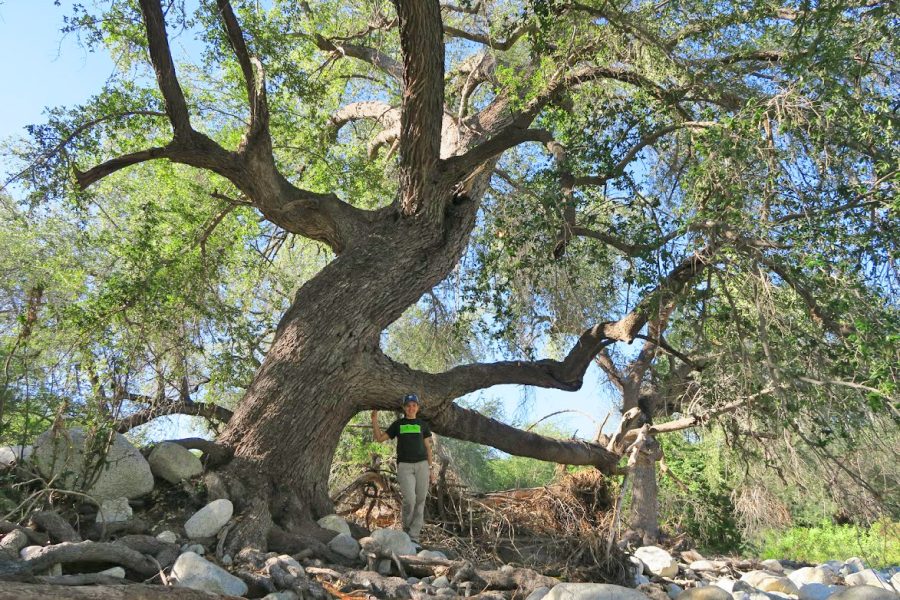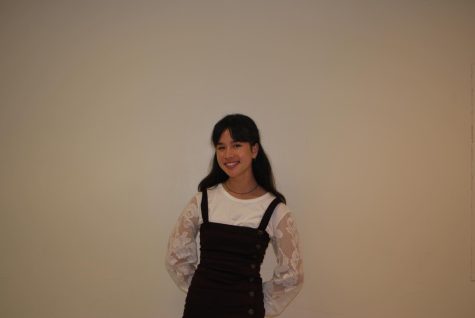Chicago advances in biodiversity
Morton Arboretum, Shedd Aquarium named ‘Center of Species Survival’
Dr. Silvia Alvarez-Clare stands in front of an endangered arroyo oak tree, Quercus brandegeei, a species the Global Tree Conservation Program of the Morton Arboretum is working to determine specific threats and identify conservation actions needed to save it from extinction (Photo courtesy of Tyler Prich).
May 22, 2023
As of March 8, a brand-new partnership formed between two iconic Chicago institutions and the world’s largest conservation organization, composed of more than 8,300 conservationists, the Species Survival Commission (SSC) of the International Union for Conservation of Nature (IUCN).
These new titles–Center for Species Survival: Trees and Center for Species Survival: Freshwater–aim to promote science-driven conservation strategies involving trees and freshwater ecosystems that face extinction or pollution, Silvia Alvarez-Clare, director of Global Tree Conservation at The Morton Arboretum, said.
“When thinking about threatened species, people usually think about rhinos, elephants and maybe sharks, but rarely do they think about trees…even though one-third of the tree species of the planet are actually threatened with extinction,” Alvarez-Clare said. “It will probably take this new generation becoming leaders of the future to fully comprehend the dimension of the problem, and to figure out what can be done to reverse this mass extinction.”
Higher biodiversity, or the variety of plant and animal life in any ecosystem, leads to increased stability, she said. With this newly established center in the Morton Arboretum–a tree-focused public garden and outdoor museum in Lisle–it aims to further assess, plan and act against tree and plant extinction with the help of the IUCN SSC. The center will also place a special emphasis on educating and inspiring the next generation through outreach programs among various Chicago Public Schools. This also has propelled the Chicago area forward as the only places in the world to have two parallel centers.
“This is something that the younger generation should care more about, even more than the older generation because [they’re] the ones that are going to have to deal with the repercussions of it,” Chuck Knapp, Vice President of Conservation Research at the Shedd Aquarium and Co-chair of the IUCN SSC Iguana Specialist Group, said.
The indoor aquarium in Chicago will focus on freshwater ecosystems, home to 51% of all fish and 80% of all vertebrates. Aiming to shine attention on a lesser-known cause (as opposed to a topic such as coral reefs), the project will zoom in on critical watersheds in Central America, where aquatic wildlife populations are at risk of extinction.
Knapp explains the potential dangers in the future of a shifting baseline in forests, a term describing a gradual change in the accepted norms of a natural environment.
“For instance, if you’re walking through Bemis Woods and you’re looking at the forest, you might say, ‘Oh, wow, it looks good to me,’ but you may not realize that all of that shrubby [and] thorny bush that you’re seeing in the understory is actually introduced and it’s not supposed to be there; it’s causing harm to wildlife,” Knapp said.
The Walder Foundation, a private family foundation based in Skokie, offered grants for this joint proposal with the intention to help fund work in environmental sustainability. Together, the Shedd Aquarium and Morton Arboretum have now helped Chicago to become a global hub for species conservation, Alvarez-Clare said.
“The technology is there,” she said. “I remain hopeful that this generation will be able to fix this mess and ultimately, save the planet.”





















![Movie poster for '[Rec]" (2007).](https://www.lionnewspaper.com/wp-content/uploads/2023/04/rec-640x900.jpg)



